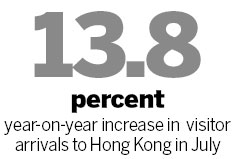New travel policy may help HK's low-end retailers
Updated: 2012-09-07 10:16
By Li Tao in Hong kong (China Daily)
|
|||||||||||
Low-end Hong Kong retailers are expected to benefit when non-permanent Shenzhen residents are allowed to start visiting the city with multi-entry permits, which will likely happen sometime this month.
However, the new travel policy will be of little help to the dismal luxury-goods sector as well as to the slowing overall retail market, analysts said.

The new visitors, who will be able to visit Hong Kong on a regular basis, are expected to buy mostly daily necessities in the primary retail sector rather than high-end goods, such as watches and jewelry, said Jiang Lu, a Hong Kong-based economist at JPMorgan Chase & Co.
"We've seen explosive shopping activity in Hong Kong in the past few years, but those who were supposed to come have already done so," Jiang said. "Given that the new policy will mainly benefit migrant workers, their relatively limited purchase power is expected to stimulate consumption in the mass-market sector rather than the luxury sector."
The Chinese mainland authorities said on Sept 1 that they would postpone the issuance of multi-entry travel permits for Hong Kong to qualified non-permanent Shenzhen residents. The new plan, which is expected to restart by the end of September, will allow 4.1 million more people to travel to Hong Kong on a regular basis.
The Hong Kong government is evaluating the new rule's impact on the city's infrastructure and resources. However, the city's retail sector - expected by some to benefit from the increasing influx of tourists - "may not see a notable lift due to the much-weakened tourist spending in a complex economic environment," said Jiang.
With a 13.8 percent year-on-year increase in visitor arrivals in July, Hong Kong's retail sales expanded a mere 3.8 percent that month. That was also the slowest growth since September 2009, reflecting the fact that the city's economy is yet to recover from the financial crisis. The government said that the local retail market was hit by the global economic turmoil and shrinking tourist spending.
Retail sales momentum is cooling in Hong Kong, weighed down by weakening consumer confidence in both the mainland and Hong Kong, according to Donna Kwok, Greater China economist at HSBC.
Kwok also noted that mainland visitors are spending less on high-end luxury items these days.
"Given the central role domestic demand has played in Hong Kong's growth since last year, a speedy mainland recovery is becoming increasingly critical," Kwok added.
A research report by BOCOM International dated Aug 31 said that the sustained Chinese tourist arrivals growth, underpinned by the latest relaxation of the individual travel scheme to the city, will provide support to the sector's growth. But the recovery pace of the city's retail sector, according to the bank, remains uncertain due to the sluggish local consumer climate.
Meanwhile, a report by Haitong International released on the same day also noted that spending sentiment on luxury products was weak on negative volume growth in Hong Kong these days, as reduced tourist spending has dragged down luxury sales of jewelry, watches and valuable gifts.
Luxury shops, which are paying skyrocketing rents in prime places to compete for rich mainland people's business, have seen a loss of growth momentum in the city.
Chow Tai Fook Jewelry Group Ltd, the world's biggest listed jewelry retailer, said in July that same-store sales in Hong Kong and Macao stores dropped 1 percent for the three months to June - a sharp slump over the 48 percent growth in same-store sales recorded for the fiscal year to March.
Simon Lo, executive director of Colliers International's Asia team, said that the affluent high-end retailers may still be able to bear the high rent prices even if sales slow down significantly.
"But retailers in the mass market are more sensitive to rent prices," Lo said. He added that if rents continue to rise, they may not be able to stand it, as rents may erode the already thin profits.
On Sept 2, Financial Secretary John Tsang wrote on his blog that the city's latest retail data made him worried as domestic consumption - the main force preventing the city's economy from dipping into recession in the first half - has seen a sharp slowdown in July.
litao@chinadailyhk.com
Related Stories
HK border cross eased for pupils in Shenzhen 2012-09-04 07:26
More to benefit from transport subsidy in HK 2012-09-03 13:33
HK to work with mainland on tourist control 2012-09-03 13:31
Secrets of the Chinese travelers 2012-09-03 09:17
HK promises to control mainland visitors' number 2012-08-29 10:35
Today's Top News
President Xi confident in recovery from quake
H7N9 update: 104 cases, 21 deaths
Telecom workers restore links
Coal mine blast kills 18 in Jilin
Intl scholarship puts China on the map
More bird flu patients discharged
Gold loses sheen, but still a safe bet
US 'turns blind eye to human rights'
Hot Topics
Lunar probe , China growth forecasts, Emission rules get tougher, China seen through 'colored lens', International board,
Editor's Picks

|

|

|

|

|

|





